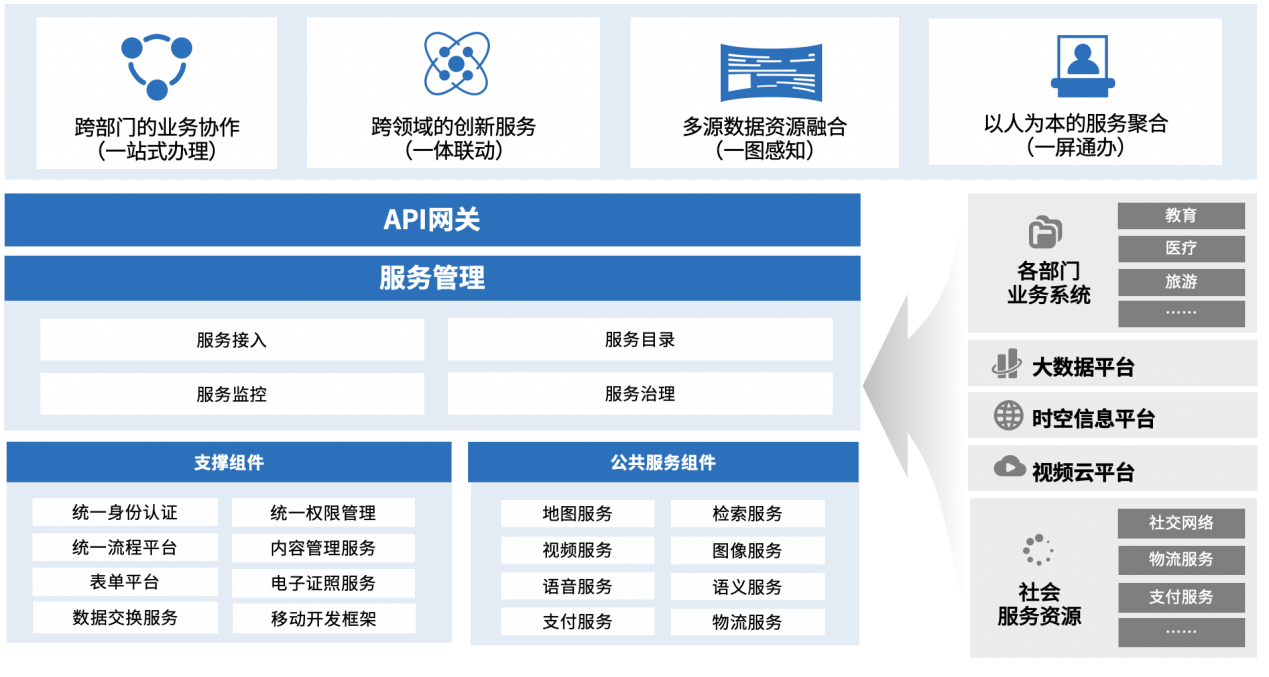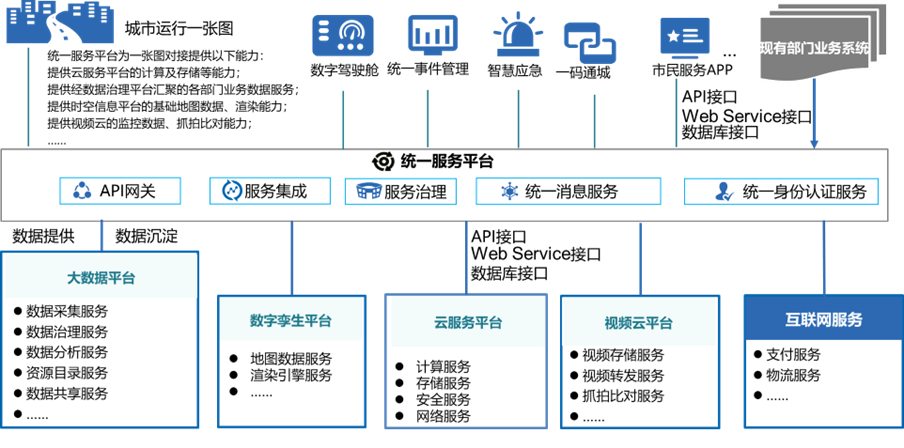

Digital Government and Smart Cities

The integrated service platform adopts a micro-service architecture, which brings together application systems in various fields, unifies the connection, unified deployment, and unified management of information resources such as various application systems, personnel information, and service APIs, and provides a rich set of public service components to support front-end business applications. The integrated service platform is the overall hub for cross-domain, cross-agency, and cross-system business collaboration. It provides more flexible and common platform-level services through standardized and intensive methods and ensures the security, reliability, high availability, and flexibility of services.

1. Unified cloud platform resource interface
The company has participated in the formulation of a number of cloud computing national standards and specifications. The platform’s APIs adopt the national standards, which can integrate with multiple departments, multiple applications, and multiple data sources to jointly create a good cloud ecological environment.
2. Global security management
The platform delivers global security management capabilities, such as dynamic access and security services, cross-domain identity authentication services, and others, which address the security authentication issue associated with cross-domain information resource integration.
3. Cross-disciplinary and cross-departmental service resource integration
The platform integrates information resources from government departments, social institutions, individuals, and other channels to achieve information sharing and business synergy between cross-domain heterogeneous systems.
4. Open service ecology
The integrated service platform provides information resource integration tools and rich service components. Through the platform, users can also connect to the Internet, various enterprise services, etc., to build a more open service ecosystem.



The integrated service platform is the overall hub for cross-domain, cross-agency, and cross-system collaboration. In response to the problems of information silos and lack of business linkage in information construction, the next-generation information technology has been adopted to comprehensively integrate information resources from government, Internet, finance, communications, business, and other fields and centralize planning, deployment, and management of various systems, information, service interfaces, etc., so as to quickly and accurately meet various business needs and accelerate cross-departmental business collaboration and linkage.


Scenario 1: Integrated Government Management Portal
The integrated service platform provides technical support for the construction of the integrated government management portal. It integrates with application systems across various departments, offering services such as unified interface management, identity and access management, and message notifications. The platform efficiently coordinates information resources across systems and promotes data sharing and business collaboration across departments, layers, and systems.
Scenario 2: The City Operation Map
To integrate various urban information resources and multiple internet services into a unified city operations map, the unified service platform connects with cloud service platforms for computing and storage capabilities, integrates business data from various departments aggregated by the city’s big data platform, interfaces with the digital twin platform for base map data and rendering capabilities, and links with video cloud platforms for monitoring data and intelligent recognition capabilities. This setup restores the real-time status of city operations and enables integrated analysis, visualization, and dynamic interaction of urban data.
Scenario 3: One-Stop Management System for Event In the City
The One-Stop Management System for Urban Governance integrates events across various departments, connecting with the 12345 service hotline, the city service app, video cloud services, and the business systems of multiple government departments. Due to the large number of system APIs and different standards, it is not conducive to the management and maintenance of the One-Stop Management System for Urban Governance platform. The integrated service platform provides event scheduling agent services for the One-Stop Management System for Urban Governance, standardizes integration and management of various systems and data resources, flexibly schedules event information, speeds up cross-departmental information collaboration, and promotes the efficient operation of the One-Stop Management System for Urban Governance.

Guangdong Provincial Science and Technology Information Center Integrated Service Platform
Guangdong Provincial Seismological Bureau Integrated Service Platform
Guangzhou Municipal Bureau of Land and Resources Public Support Platform
Shenzhen Municipal Public Security Bureau People's Livelihood Police Integrated Service Platform
Hunan Province Yiyang City New Smart City Integrated Service Platform
Yunnan Province Baoshan City Information and Beneficiaries Integrated Service Platform
Henan Province Wugang City Integrated Smart Service Platform
Awards:
2017 China International Software Expo Gold Award Nomination
• 2017 Greater Bay Area New Smart City Summit Forum "Innovative Application Award”
The 3rd (2015) China Smart City Annual Conference "Outstanding Solution"